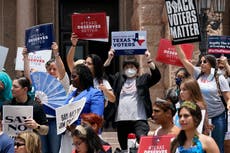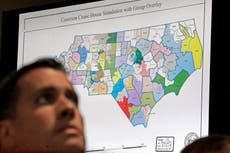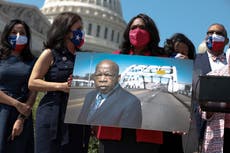Texas Republicans pass sweeping voting restrictions in latest victory for GOP campaign to limit ballot access
Texas Democrats urge Congress to ‘act immediately’ to pass federal voting rights measures: ‘We knew we wouldn’t be able to hold off this day forever’
Texas lawmakers have passed a final version of Republican-backed legislation to restrict voting access across the state, despite protests from the state’s Democrats to obstruct its passage in the midst of the GOP’s nationwide campaign to curb ballot access.
Governor Greg Abbott – who called lawmakers to the statehouse for two special sessions to get the measure passed – will sign the bill into law, which is expected to draw legal challenges from the state’s voting rights advocates and Democratic lawmakers.
Only one Republican member of the state House joined Democrats to oppose the legislation; the Senate passed the bill on a party-line vote.
Its passage marks the latest GOP victory in a campaign to roll back ballot access and consolidate electoral oversight into the hands of Republican-dominated state legislatures, emboldened by Donald Trump’s baseless “stolen election” narrative echoed in statehouses across the US, under the guise of protecting “voter confidence” and “election integrity” despite unprecedented voter turnout in 2020 elections and no evidence of widespread fraud.
Within the first few months of 2021, Republican state lawmakers filed nearly 400 bills in nearly every state to roll back voting by mail, impose strict voter ID requirements, cut back on early voting hours and criminalise handing out food and water in long lines at polling places, among other measures.
By mid-July, at least 18 states enacted 30 new laws that restrict access to the ballot, according to the Brennan Center for Justice at NYU Law.
A parallel effort from GOP lawmakers has seen more than 200 bills in 41 states that would give themselves more authority over the electoral process, according to the States United Democracy Center.
The persistent “stolen election” lie has “turned into a cancer in our politics” and poses “an existential threat to our democracy,” state Sen Sarah Eckhardt told lawmakers ahead of her chamber’s vote.
By endorsing the bill, she said Republican lawmakers have propelled “a narrative that is leading us toward authoritarianism, violence and the kind of insurrectionist actions that we saw in Washington DC.”
The Texas legislation would embolden partisan poll watchers to harass election workers and voters, the bill’s critics have argued. Measures banning 24-hour and drive-though early voting – which proved popular during the coronavirus pandemic – largely single out Harris County, one of the largest counties in the country, and where voters of colour disproportionately relied on expanded access.
Despite the bill’s disparate racial impact, Texas House Speaker Dade Phelan told lawmakers not to use the word “racism” while debating the bill.
The bill also criminalises election workers who make unintended errors or send out unsolicited applications for mail-in ballots, and bans local jurisdictions from implementing their own policies to expand voter access, among other measures.
In a statement, the governor said Senate Bill 1 will “solidify trust and confidence in the outcome of our elections by making it easier to vote and harder to cheat. I look forward to signing Senate Bill 1 into law, ensuring election integrity in Texas”.
Texas Democrats have cast the bill as a “racist, anti-democracy bill that will cement Texas’s ranking as the hardest state in the country to vote in”.
Last month, a group of Texas Democratic lawmakers travelled to Washington DC in a last-ditch effort to block passage of the legislation during a special legislative session called by the governor to pass several items on his agenda.
While at the Capitol, lawmakers lobbied the White House and members of Congress to push for sweeping federal voting rights protections while stressing that their time is running out, and that Governor Abbott’s signature was likely imminent once they were forced to return.
“We knew we wouldn’t be able to hold off this day forever,” Texas House Democratic Caucus chair Chris Turner said in a statement. “Now that it has come, we need the US Senate to act immediately to pass federal legislation to protect Texas voters from Republicans’ assault on our democracy.”
Texas Democratic Party chair Gilberto Hinojosa said “Texas Republicans are committed to staying in power at any cost – even at the expense of our democracy”.
“This bill has always been about Republicans silencing the voices of millions of Texans because they cannot win any other way,” he said in a statement.
He urged Congress to pass the For The People Act and John Lewis Voting Rights Advancement Act, a pair of federal elections bills passed by the Democratically controlled House of Representatives that face GOP blockades in an evenly divided Senate.
“Nothing less is on the line,” he said.
Join our commenting forum
Join thought-provoking conversations, follow other Independent readers and see their replies
Comments




Bookmark popover
Removed from bookmarks